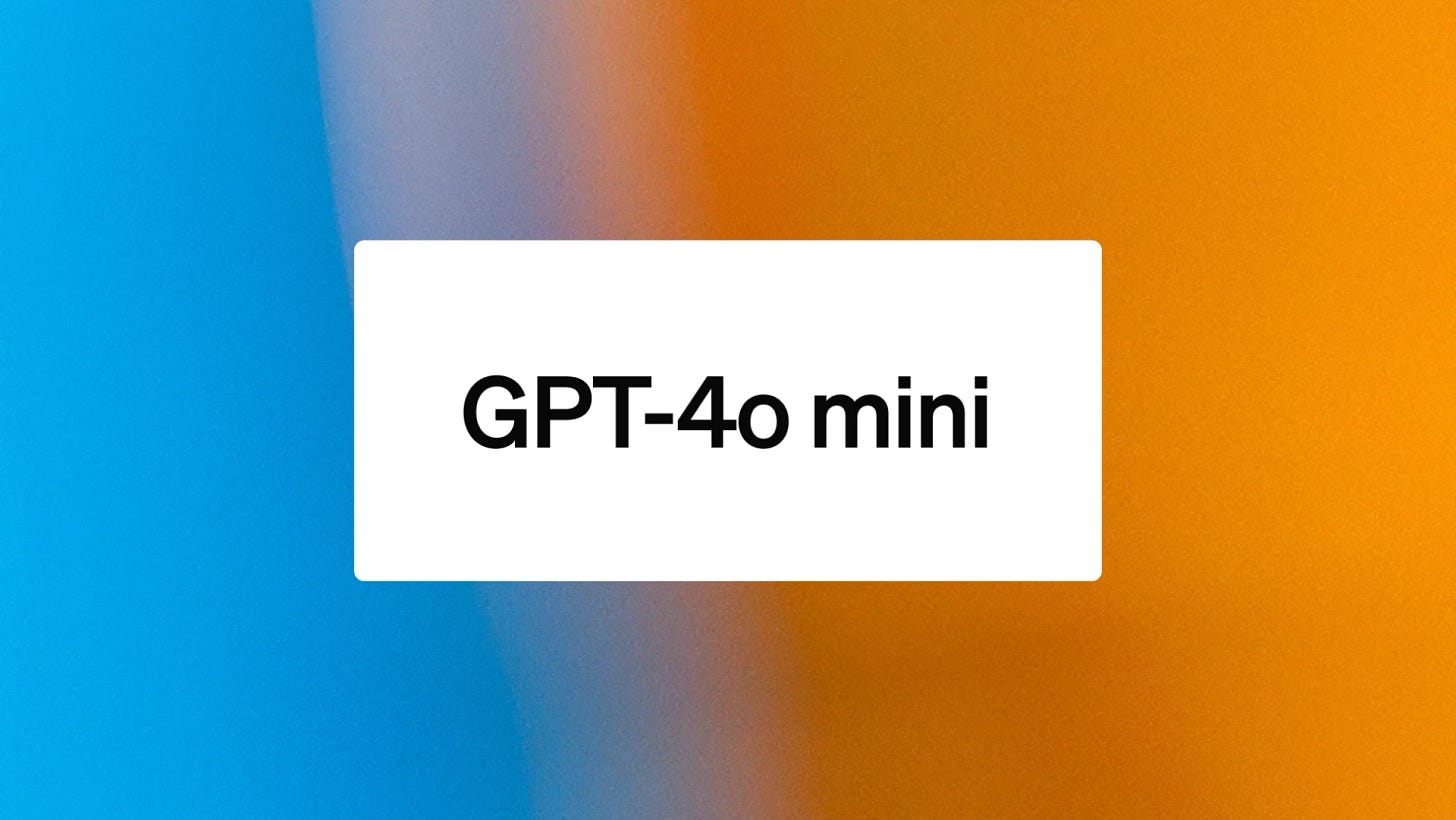The biggest news of the week was OpenAI’s launch of GPT-4o mini which is the first ‘small’ model that they’ve released. We also had confirmation from Meta that they will be releasing their largest Llama 3 model next week, but unfortunately only the text version will be available in the EU. We also had the launch of Codestral Mamba from France’s Mistral, which is a small, specialised model for coding applications.
OpenAI launches GPT-4o mini
OpenAI quietly released GPT-4o mini this week. In some ways it was a bit of a surprise as this is the first ‘small’ model that OpenAI have launched, but it is now becoming much more commonplace for companies to release a ‘family’ of new models that include models of different sizes with different cost/capability trade offs.
GPT-4o mini seems very capable from the benchmarks shared, industry commentary and my own testing. It’s also 97% cheaper for developers to use and much faster, so some really good improvements in performance.
Meta will be launching their largest Llama model next week, but not in the EU
Meta launched the small (8B parameters) and medium (70B parameters) sized versions of Llama 3 back in April, and will now be launching their largest version (405B parameters) next week. This should be the first open source model that delivers similar performance to GPT-4.
The other big change for the largest Llama 3 model is that it will be Meta’s first open source multimodal model, capable of processing both images and text and able to generate both images and text.
Unfortunately, Meta won’t be launching the multimodal capabilities of their largest model in the EU. This is similar to Apple’s recent stance on delaying the launch of some Apple Intelligence features in the EU. The issue for both Meta and Apple seems to be the ambiguity of the EU’s regulations and the uncertainty of whether these new features contravene the EU’s Digital Markets Act (DMA). When OpenAI launched ChatGPT’s memory features back in February they also said they wouldn’t be available in the EU, and still aren’t.
This is a worrying trend for EU citizens as it’s looking more likely that we won’t be able to access and benefit from some of the latest AI technologies and we’re in danger of falling behind other regions and there being a two-speed approach to AI across the globe.
Mistral releases new specialised model for coding
It’s great to see another model released by France’s Mistral. This time it’s a small open source model focused on coding and offers faster responses and a larger complex window, which is important for helping with large code bases. Because it’s small (7B parameters) it can be run locally on device and in benchmarking tests Codestral Mamba did better than its open source rivals from Meta and Google.
This points to an interesting future where we have smaller, faster models for specialised use cases that complement the larger, general frontier models. This will allow people faster, cheaper and more convenient access for specialised use cases.
AI Ethics News
Scarlett Johansson says OpenAI’s Sam Altman would make a good Marvel villain after voice dispute
User alleges Gemini AI scanning Google Drive hosted PDF files without explicit permission
Microsoft faces UK antitrust probe after hiring Inflection AI founders and employees
OpenAI reportedly "squeezed" through safety testing for GPT-4 Omni in just one week
Google’s wrong answer to the threat of AI: default to not indexing content
Long Reads
Timescale: A Brief History of AI: How Did We Get Here, and What's Next?
TechCrunch: What exactly is an AI agent?
Science: Generative AI enhances individual creativity but reduces the collective diversity of novel content
Fortune - Google chief scientist Jeff Dean: AI needs ‘algorithmic breakthroughs,’ and AI is not to blame for brunt of data center emissions increase
“The future is already here, it’s just not evenly distributed.“
William Gibson






